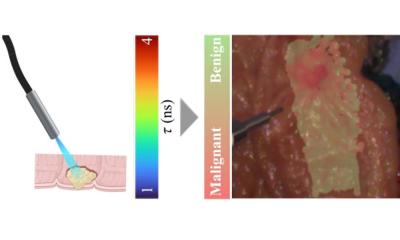Ophthalmology
New eye test detects earliest signs of glaucoma
A simple eye test could help solve the biggest global cause of irreversible blindness, glaucoma. In clinical trials, the pioneering diagnostic test - developed by researchers at UCL Institute of Ophthalmology and the Western Eye Hospital - allowed doctors to see individual nerve cell death in the back of the eye.

Glaucoma affects 60 million people in the world, with 1 in 10 suffering total sight loss in both eyes. Early detection means doctors can start treatments before sight loss begins. The test also has potential for early diagnosis of other degenerative neurological conditions, including Parkinson's, Alzheimer's and multiple sclerosis. Results of first clinical trials with glaucoma patients are published in the journal BRAIN.
Professor Francesca Cordeiro at UCL Institute of Ophthalmology, who led the research, said: "Detecting glaucoma early is vital as symptoms are not always obvious. Although detection has been improving, most patients have lost a third of vision by the time they are diagnosed. Now, for the first time, we have been able to show individual cell death and detect the earliest signs of glaucoma. While we cannot cure the disease, our test means treatment can start before symptoms begin. In the future, the test could also be used to diagnose other neurodegenerative diseases."
Loss of sight in patients with glaucoma is caused by the death of cells in the retina at the back of the eye. This cell death is called apoptosis. As with other neurodegenerative conditions, more and more nerve cells are lost as the disease progresses.
Professor Philip Bloom, Chief Investigator at Western Eye Hospital, part of Imperial College Healthcare NHS Trust, added: "Treatment is much more successful when it is begun in early stages of the disease, when sight loss is minimal. Our developments mean we could diagnose patients 10 years earlier than was previously possible." The technique developed is called DARC, which stands for detection of apoptosing retinal cells. It uses a specially developed fluorescent marker which attaches to cell proteins when injected into patients. Sick cells appear as white fluorescent spots during eye examination. UCL Business, the commercialisation company of UCL, holds the patents for the technology. The examination uses equipment used during routine hospital eye examinations. Researchers hope that eventually it may be possible for opticians to do the tests, enabling even earlier detection of the disease.
The research is funded by Wellcome Trust. Bethan Hughes, from Wellcome's Innovation team said: "This innovation has the potential to transform lives for those who suffer loss of sight through glaucoma, and offers hope of a breakthrough in early diagnosis of other neurodegenerative diseases. Loss of sight as you age is an incredibly difficult disability, impacting quality of life and independence."
Initial clinical trials were carried out on a small number of glaucoma patients and compared with tests on healthy people. The initial clinical trials established the safety of the test for patients. Further studies will now be carried out to into DARC and how it can be used not only to diagnose and treat glaucoma patients but also for other neurodegenerative conditions.
Source: UCL Institute of Ophthalmology
30.04.2017






